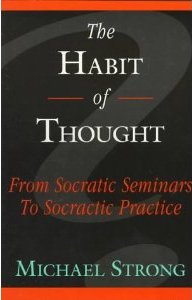I like this paragraph from Michael Strong’s The Habit of Thought:
 “The effort of Socratic Practice is to develop students’ own standard of intellectual judgment by means of placing the onus of responsibility for understanding entirely on them and providing them with the tools and experiences necessary to develop their intellectual judgment. ‘Does it make sense to you?’ is the central question to students whenever we are working to understand a text. As long as the student knows that, whether by didactic instruction or by subtle conversational manipulation, she will ultimately be led to the ‘right’ answer, she will never rely on her own judgment in the deepest sense. In order to come to rely on her judgment, and to feel a need to refine it, she must continually be put in situations where she is completely on her own.” (p. 15)
“The effort of Socratic Practice is to develop students’ own standard of intellectual judgment by means of placing the onus of responsibility for understanding entirely on them and providing them with the tools and experiences necessary to develop their intellectual judgment. ‘Does it make sense to you?’ is the central question to students whenever we are working to understand a text. As long as the student knows that, whether by didactic instruction or by subtle conversational manipulation, she will ultimately be led to the ‘right’ answer, she will never rely on her own judgment in the deepest sense. In order to come to rely on her judgment, and to feel a need to refine it, she must continually be put in situations where she is completely on her own.” (p. 15)
This semester Marsha Enright and I are experimenting with Socratic Seminars in my Philosophical Foundations of Education course. So far we have done sessions with selections from Plato’s Allegory of the Cave [pdf] from The Republic, John Locke’s Some Thoughts Concerning Education [pdf], and John Dewey’s Democracy in Education [pdf] .
I see this a lot in my entrepreneurship classes. Students are so busy looking for the “right answer” that they fail to recognize that “right answers” in the chaotic world of a business launch do not exist like solutions to algebra problems in the back of the book. Sometimes, the questions are not even well-defined. To get them to figure things out on their own and trust that they are perfectly capable of doing so is a monumental undertaking, and one I have to work constantly. Kudos on your efforts to build Socratic Seminars.
Nice connection to entrepreneurial thinking, Terry. Developing the cognitive skills really is, as you say, a monumental job.